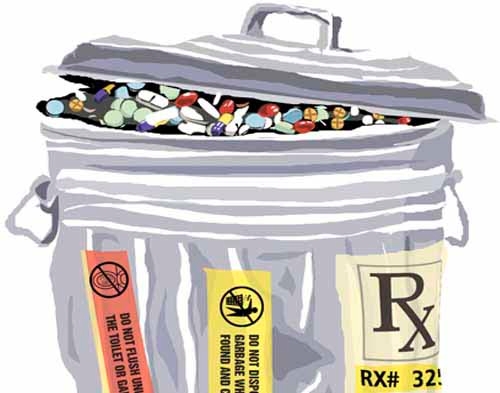Leftover medication can pose several hazards


The label didn’t say "Please finish all this medication," and you didn’t, so now you have a few pills left, and wonder about the best way to get rid of them. To flush or not to flush? To trash or not to trash?
Neither, if you care about those pesky "tree-hugger" things such as the safety of the water supply and the problem of drug abuse.
"There are a couple of different standpoints from a public health view," said Jennifer Sizemore, spokeswoman for the Southern Nevada Health District. "That’s why we think it’s really important."
"Environmentally, it’s huge as far as impacting our sewage system," said Marcus Martin, public information officer for the Metropolitan Police Department. "People flush untold volumes of prescription and illicit drugs."
According to the United States Environmental Protection Agency, pharmaceuticals have been detected in bodies of water across the country, in part because of the chemicals that pass through our systems. But flushing them only compounds things.
And the problem is widespread. The website for the Clark County Water Reclamation District’s "Pain in the Drain" program, www.paininthedrain.com, says that according to the U.S. Geological Survey, low concentrations of chemicals found in pharmaceuticals were found in 80 percent of 139 streams sampled in 30 states.
And if you don’t see a link between sewers and potable water, think again; the district notes that the components of flushed medications "can remain in the treated water when it is released into the water cycle."
Tossing medication in the trash, though, isn’t a case of possibly contaminating the water supply via the landfill; it’s a case of possibly contaminating your neighbor.
"You don’t know who’s going to go through your trash," Martin said. "Keeping it in the house is a no-brainer," because medication kept around can be hazardous to children or to those with substance-abuse problems.
Martin added that burglaries sometimes are committed by people looking for leftover prescription medication. It’s an even bigger problem, he said, if someone who’s an abuser knows you’re taking a particular drug.
"That’s very common with family members," he said.
Martin said there used to be twice-yearly collections to empty out those medicine cabinets. Now, he noted, Las Vegas police have collection boxes — as do the Henderson and Boulder City police departments — where unwanted medications can be discarded (see accompanying list).
"It’s definitely being used," said Todd Rasmussen of the Henderson Police Department. "It can be anything from anti-depressants to pain pills."
The water-reclamation district offers an alternative for those who can’t get to a police department collection point or may have an extremely small amount of medication to discard. It suggests the following steps:
■ Remove your personal information from the container.
■ Add water and absorbent material such as cat litter, sawdust, dirt, salt or flour to the bottle and recap
■ Tape the lid shut, and put the container inside another, such as a discarded margarine tub. Enclose it in a bag and place it in the trash.
Contact reporter Heidi Knapp Rinella at hrinella@reviewjournal.com or 702-383-0474.
PRESCRIPTION DRUG DISPOSAL SITESMETROPOLITAN POLICE DEPARTMENT
• Northwest Area Command, 9850 W. Cheyenne Ave.
• Bolden Area Command, 1851 Stella Lake St.
• Northeast Area Command, 3750 Cecile Ave.
• Convention Center Area Command, 750 Sierra Vista Drive
• Southeast Area Command, 3675 E. Harmon Ave.
• Southcentral Area Command, 4860 Las Vegas Blvd. South
• Enterprise Area Command, 6975 W. Windmill Lane
• Overton Substation, 320 N. Moapa Blvd., Overton
• Laughlin Substation, Regional Government Center, 101 Laughlin Civic Way, Laughlin
HENDERSON POLICE DEPARTMENT
• East Patrol Command, 223 Lead St.
• West Patrol Command, 300 S. Green Valley Parkway
• North Patrol Command, 225 E. Sunset Road
BOULDER CITY
1005 Arizona St.












